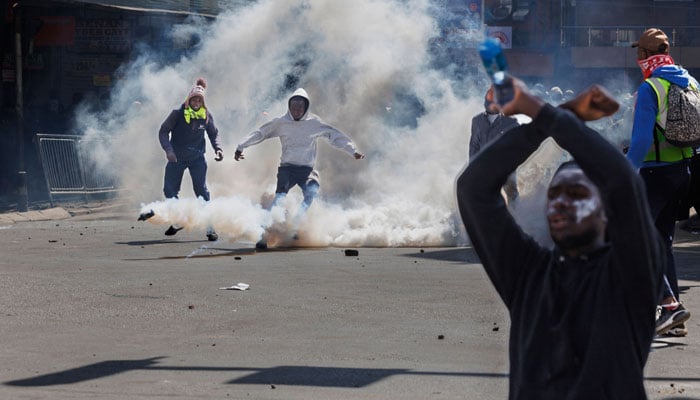
Kenyan President Ruto condemned the unrest in the capital Nairobi and promised a swift and decisive response to "violence and anarchy" after the anti-tax demonstrations turned deadly.
Chaos gripped Nairobi on Tuesday as protests against proposed tax hikes escalated into violence, leading to the deaths of five people and injuries to 31 others. Demonstrators stormed the grounds of the parliament, prompting a stern response from Kenyan President William Ruto.
"We shall provide a full, effective, and expeditious response to today’s treasonous events," he said, addressing a press briefing on Wednesday. He denounced the protests as having been taken over by "dangerous people."
Ruto further stated, "It is inconceivable that criminals pretending to be peaceful protesters can reign terror against the people, their elected representatives, and the institutions established under our constitution and expect to go scot-free."
The protests were driven by widespread anger over the government’s proposed tax increases amidst a cost-of-living crisis. Demonstrators clashed with police, threw stones, and pushed past barricades to enter the parliament grounds. Elizabeth Nyaberi, a 26-year-old lawyer participating in the protests, voiced the frustration of many, saying, "This is the voice of the young people of Kenya. They are tear gassing us, but we don’t care."
International reactions have been swift. The United States appealed for calm, while thirteen Western nations, including Canada, Germany, and Britain, expressed their shock at the violence. UN Secretary-General Antonio Guterres conveyed his deep concern and sadness over the violence and casualties. Similarly, African Union Commission chief Moussa Faki Mahamat called for restraint to prevent further violence.
Amnesty International’s Kenya chapter highlighted the deteriorating situation, urging the government to respect the right to peaceful assembly. Allegations have also surfaced about the abduction of protesters by police officers in civilian clothes. The Kenya Human Rights Commission demanded the unconditional release of all abductees.
Despite recent government concessions to roll back some tax hikes, plans to increase other levies, including on fuel and exports, remain in place to address budget shortfalls. Critics argue these measures will worsen living costs in a nation already struggling with high inflation and widespread poverty.
Kenya, with one of East Africa’s most dynamic economies, faces significant challenges, including a third of its population living in poverty and rising debt servicing costs due to a depreciating currency.













